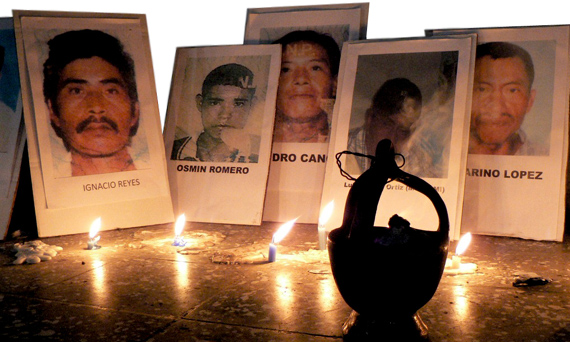|
United in solidarity to support of the struggle
in
Bajo Aguán
Successful International Meeting for Human Rights and Against Exploitation
|
From
February 16 to 20, the Colón city of Tocoa hosted the International Meeting for
Human Rights in Solidarity with Honduras, convened to denounce the critical
situation of human rights abuses in the country and particularly in Bajo Aguán,
and to devise mobilization strategies. The event was organized by the Permanent
Observatory for Human Rights in Aguán and numerous national and international
organizations.
Over the course of four
days, the more than 1,200 delegates from across Honduras and several countries
around the world learned about, discussed and exchanged views on the human
rights crisis in the country in general and the Bajo Aguán region in particular.
They also heard
heartrending testimonies from victims of harassment and repression, and learned
of the different forms of struggle implemented by peasant organizations that are
fighting for access to land and the right to food security and against a
predatory and exploitative single-crop production model backed by international
financial agencies.
| |
|
| |
“The
presence of a hundred international delegates and more than 30
foreign journalists gives us strength and great hope for the
future.” |
| |
|
“We had a massive
response to the call, in a great show of international solidarity. The challenge
before us now is to draw on this solidarity and build an international movement
against the coup, human rights abuses and impunity,” Bertha Cáceres,
coordinator of the Civic Council of Popular and Indigenous Organizations of
Honduras (COPINH), told
Sirel.
The meeting included
thematic workshops on gender, childhood, indigenous peoples and afro-descendant
communities, held in various peasant settlements.
“The result has
exceeded all expectations. The presence of a hundred international delegates and
more than 30 foreign journalists gives us strength and great hope for the
future,” Cáceres said.
The event also saw some
very moving moments, including a tribute paid to the victims and martyrs of Bajo
Aguán and the testimonies of the survivors. In a little over two years, 45
organized peasants have lost their lives in this region’s land conflict.
“It was a heartbreaking
moment. You could see the need for justice and a sense of impotence in the faces
of the victims’ families. Our challenge now is to channel that pain and use it
to fuel our struggle and coordination efforts,” the indigenous leader said.
According to Esly
Banegas, leader of the Coordinating Group of Popular
Organizations of Aguán (COPA), the meeting exposed the hypocrisy of the
regime.
| |
|
| |
“We need to
keep letting the world know what’s going on in the region,
increasing solidarity, combating impunity, and promoting unity.” |
| |
|
The
government “wants to make the international community believe that because it
has signed agreements with some peasant groups it has solved the conflict in
Bajo Aguán. We know that’s not so and that the regime will continue with its
policy of violence and terror.”
“We
need to keep letting the world know what’s going on in the region, increasing
solidarity, combating impunity, and promoting unity,” said
Banegas,
also the president of the Tocoa division of the National Agricultural Institute
Workers’ Union (SITRAINA). She welcomed the presence of IUF Latin
America’s (Rel-UITA) at the meeting and thanked the organization for
its systematic coverage of the conflict in Bajo Aguán.
Final statement
The
event came to a close with a
Final Statement issued by the Organizing Committee, calling for, among
other demands, a
real solution to the land conflict in Bajo Aguán “without indecent land sale
negotiations.”
The statement also
called for the immediate release of José Isabel Morales, a political
prisoner jailed for his involvement in the Peasant Movement of Aguán (MCA),
as well as the dismissal of all charges against the more than 500 peasants
unjustly sued, the demilitarization of the region, an end to impunity, and the
strengthening of the Permanent International Observatory for Human Rights in
Aguán.
Lastly, the national
and international delegates agreed to carry out a number of actions, which will
be monitored by an ad hoc committee.
 |